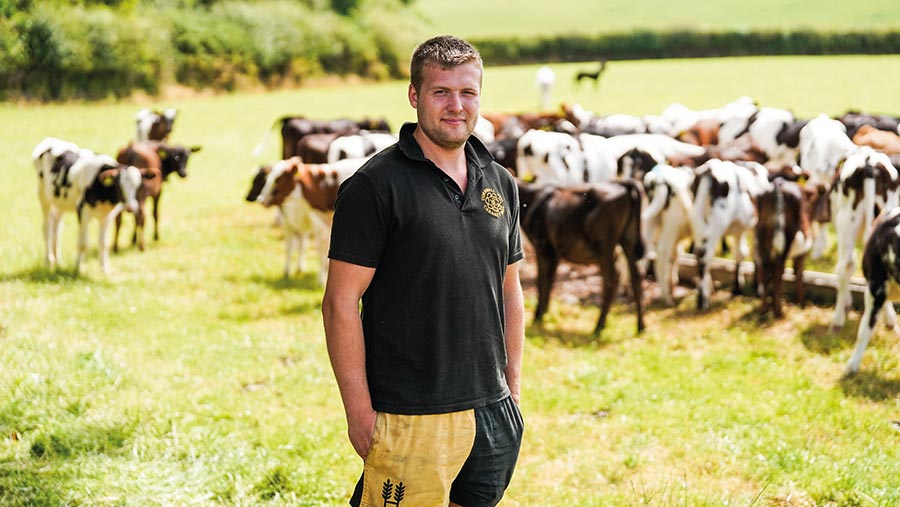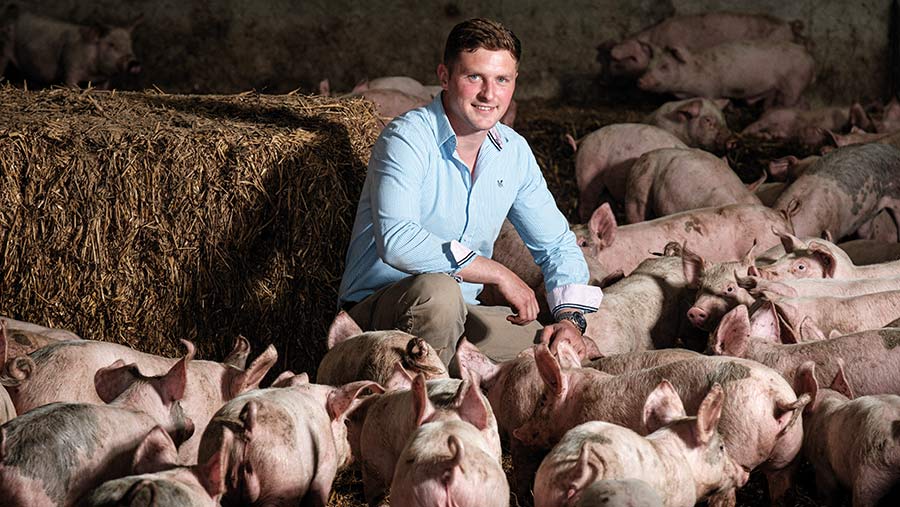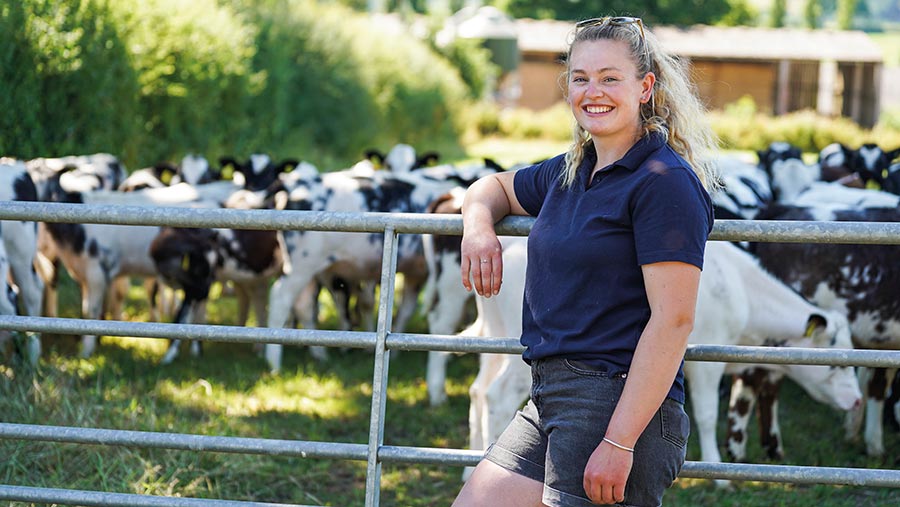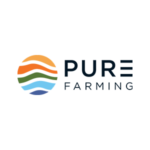Farmers Weekly Awards 2022: Young Farmer of the Year finalists

This year’s three finalists have started and grown successful farming businesses after taking on a huge level of responsibility from a young age.
Their passion for agriculture, the environment and always improving is clear to see.
The judging team visited each of the finalists for a three-hour interview and farm tour.
See also: Farmers Weekly Awards: 2022 shortlist announced
The finalists:
- Dan Lethbridge, South Treviddo Farm, Cornwall
- Matthew Nichols, Manor Farm, North Yorkshire
- Emily Pearse, Sheppark Farm, Devon
The judges:
- Harriet Ross, 2021 Farmers Weekly Awards Young Farmer of the Year
- Cath Crowther, CLA East regional director
- Lauren Harris, Farmers Weekly deputy business editor
Dan Lethbridge
South Treviddo Farm, Cornwall

Dan Lethbridge, Farmers Weekly Awards 2022 Young Farmer of the Year finalist © Emily Fleur
Dan Lethbridge comes from a farming background and became interested in farming at a young age, helping out as a relief milker as a teenager.
He completed an agriculture diploma at Duchy College before becoming a full-time contractor, where he has worked for 10 years.
In 2020, Dan successfully applied for a Cornwall Council holding on a 10-year farm business tenancy agreement.
Getting started
When he was 18, Dan borrowed money from the bank to buy his first store lambs and used the profit to buy some breeding ewes, and his flock has continued growing ever since.
He lambed 500 ewes this year and next year aims to increase this to 1,000 ewes, lambing in two batches.
Dan was on the waiting list to apply for a council farm and as part of the application process created a business plan and faced an interview panel before being selected.
Fortunately, the holding was local to him and his rented land is based either side, making it a convenient block.
As his own business has grown, his contracting work has become more flexible, and he also sponges his flock to save time and money.
Current business
Dan’s progress since moving to the council holding has been stifled somewhat by the amount of repairs that were required, as well as water access issues and difficulty sourcing materials and contractors to complete fencing, despite having funding from Countryside Stewardship.
However, he has started a new calf-rearing enterprise, buying mainly New Zealand Holstein and Belgian Blue cross Jerseys to sell at about 10 months through a dealer.
Buying less-expensive calves helps manage the risk, and the business helps with cashflow, provides manure and helps improve the “sheep-sick” land.
Meanwhile, the bigger lambs are sold at market, with most of the average lambs going to the abattoir, and a few being sold directly to a local pub.
The farm’s five-year Countryside Stewardship agreement includes growing turnips and herbal leys, as well as biannual hedgetrimming.
Going forward
Dan’s main goal is to increase sheep numbers to 1,000-plus ewes. He has another farm business tenancy of 24ha of bare land due to start in December, as well as 16ha of solar panels offered for his sheep to graze around for free.
He said he would love his own farm, but in the meantime plans to keep picking up as much extra rented land as he can considering the huge demand and high prices in the area.
Prior to moving to the council holding, Dan didn’t receive BPS money so his business is not reliant upon it, which will be useful as the payments decrease over the next few years.
He would like to do some further research into carbon accounting because he thinks his output would be quite minimal and has already trialled using granular seaweed instead of fertiliser on the tenanted land, and plans to continue using this.
To mitigate some lameness issues with his lambs, Dan wants to work on passing the flock through foot-baths each week and keep improving health and welfare standards.
What the judges say
Dan has taken every opportunity that came his way and merged multiple enterprises to create a solid business structure. He combines hard work with a positive attitude to secure results.
Dan Lethbridge summary
The judges liked
- Passionate about business and sets clear goals
- Understands need to mitigate risk and improve cashflow
- Interested in carbon accounting and environmental schemes
- YFC chairman during worst of Covid-19 pandemic and supported community
- Seeks advice from experts, professionals and other farmers
- Utilises grant schemes to invest in sheep handling equipment
Farm facts
- 10-year farm business tenancy on Cornwall Council holding
- Full-time contractor
- 500 ewes and 1,000 lambs this year
- Mix of Dorsets, Suffolks, Scottish Black Faces and Welsh Mountains
- Rears calves to sell through dealer or at market
- Countryside Stewardship Mid Tier agreement
- Rotates turnips and kale
The numbers
- 27 years old
- 36ha on council holding
- 57ha on farm business tenancy
- 40ha on grass let
- 500 ewes lambed this year
- 7 sheepdogs
Matthew Nichols
Manor Farm, North Yorkshire

Matthew Nichols, Farmers Weekly Awards 2022 Young Farmer of the Year finalist © Emily Fleur
Matthew Nichols is a fifth-generation farmer balancing managing an arable and B&B pig unit while offering independent agronomy and contracting services.
He runs the farm in partnership with his grandmother after his parents and grandfather sadly passed away over a 10-year period.
Having converted the holding to a regenerative, zero-till system, Matthew plans to add more livestock to the business in the near future.
Getting started
Matthew’s farming interest began as a child, helping out on the farm and gradually picking up more knowledge and responsibility.
At 16 he studied agriculture at Askham Bryan College alongside working for a neighbouring farmer, where his employer encouraged Matthew to market some wheat on his behalf, which helped him learn about costings and better understand the market.
After college, Matthew became a trainee agronomist at Procam, completing Basis, Facts and Advanced Cereals Basis.
Deciding the sales and commercial side of the job wasn’t for him, Matthew started an independent agronomy business at age 24 and sourced some customers by offering something different and saving them money, building to cover about 4,000ha in his local area.
Current business
As well as crop walking, he began picking up some arable work and started a partnership with his grandparents at the family farm.
In 2018, his grandfather died and Matthew took a 51% share in the partnership with his grandmother to qualify for the Young Farmer extra BPS payment.
Since then, he has moved the business from rotational cropping of large blocks of wheat, barley and oilseed rape to smaller fields with alternative crops and different break crops, and a zero-till method, which suits the land.
He wanted to see if he could make the regenerative farming technique work and said the financial element was crucial, especially in terms of investing in kit.
The B&B pigs were introduced in 2020, using the onsite buildings and complementing the arable system. The low-risk contract helps with cashflow and the manure can be utilised on farm.
The weaners come in at four weeks and go after nine weeks and, depending on their age, only need checking once or twice a day.
Matthew is also trying to establish a cover crop that provides a financial return and grazing.
Going forward
The farm currently has no boundary fences so to secure it all would be expensive, but in the future Matthew would like to introduce sheep and cattle, and possibly free-range poultry.
He is also the vice-chairman of the local NFU branch and wants to generate more interest in the union and encourage more young people to attend the meetings and get involved.
Priorities going forward include adding more B&B pigs, finding a way to justify employing someone full-time, and looking into entering the Sustainable Farming Incentive.
“It’s difficult to get more land in this area because there’s lots of competition, but I could potentially look into some sort of share farming agreement with neighbours, where I offer my expertise, knowledge and labour,” said Matthew.
“The end goal is to farm in my own right only, without contracting or agronomy.”
What the judges say
Matthew has overcome a number of challenges while accelerating his agricultural learning, experience and qualifications. He has wide-ranging ambitions that are sure to come to fruition.
Matthew Nichols summary
The judges liked
- Takes on research for new ideas himself and keen to learn, trial and implement
- Does own paperwork, applications and accounts
- Running health and yield trial of treated and non-treated own-mixed five variety wheat blend
- Adding enterprises that complement each other and allow him to work smarter
- Member of local benchmarking group and AHDB Monitor Farm steering group
Farm facts
- Fifth-generation arable farmer
- Regen farming and zero-till
- Growing winter wheat, spring and winter beans, oilseed rape, linseed, spring barley, naked oats, cover crops, herbal ley
- Independent agronomist
- Contractor: spraying and direct-drilling
- B&B pigs contract with Ian Mosey
- Offers on-farm storage
- Mid-tier CS agreement
The numbers
- 29 years old
- 4,000ha managing as agronomist
- 60ha owned
- 1,500 pigs on B&B contract
- 1 part-time worker
Emily Pearse
Sheppark Farm, Devon

Emily Pearse, Farmers Weekly Awards 2022 Young Farmer of the Year finalist © Emily Fleur
Emily Pearse originally studied fashion design at university before dropping out to pursue a career in agriculture.
She completed an apprenticeship, discovered a love for sheep and built up her experience working on various units.
Now, Emily manages the beef herd on her partner’s family farm as well as rearing calves, growing her own flock and working as a contract shepherd.
Getting started
She was paired with a beef and sheep unit for the two-year apprenticeship programme at Bicton College and spent as much time as she could with the sheep and learning about livestock, as well as buying her first sheepdog.
Once the apprenticeship ended, Emily worked with local farmers on other types of units to gain more experience, and after meeting her partner, Tom, the couple took on some ground and started their own flock.
She then studied Agricultural Management at Bicton and became a self-employed contract shepherd, travelling around Devon.
This year has been Emily’s first full-time year working on the family farm, alongside running her own business.
Current business
Tom works for a contractor and his parents are semi-retired, with Emily managing much of the day-to-day work, including the 385 Belgian Blues and Herefords.
She also rears two batches of calves a year, which arrive at two weeks old, are weaned at nine weeks, and finished at 25 weeks before being sold directly to Dunbia.
Emily works as a contract shepherd year-round, with four main customers in Devon, as well as travelling further afield to work in new systems.
She plans to keep it up around the work on the farm but doesn’t want to increase her customer base, to allow her to stay home as much as is necessary.
Emily lambed 100 ewes within her own flock this year on 20ha of rented ground, selling them as store lambs or finished at the local market. She lambs outside in April in one cycle so needs them to be good mothers and has a high culling policy.
The business has a few tractors and borrows other machinery as needed, as well as getting some casual labour in for TB testing and anything else that requires an extra pair of hands.
Going forward
Emily is self-employed at the moment but discussions are taking place to create a partnership between Emily, Tom and Tom’s parents in the near future.
She takes on all the cattle documents and passports and helps with the accounts and taxes, as well as doing all the paperwork for her own business.
Emily plans to look into carbon accounting, as well as Environmental Land Management schemes, which she believes will be a better fit for the business than Countryside Stewardship.
She weighs the cattle regularly and finds the dairy-bred animals harder to fatten than the Blues, and is planning to move towards running more native breeds.
The main priorities going forward include improving grassland management, choosing the best grazing system, sorting out better water access and avoiding wormer resistance.
“I just want to make what we’re doing even better and make sure we’re improving what we’ve got,” Emily said.
What the judges say
Emily has grown from a non-traditional farming background to a fully-fledged farmer in her own right. She has great knowledge about the industry and her businesses and is highly dedicated.
Emily Pearse summary
The judges liked
- Clear love of farming and willing to work hard
- Understands future challenges within business and industry
- Keen to keep learning and implement new ideas
- Made good use of Farming Equipment and Technology Fund
- Strong and sensible aims and ambitions
Farm facts
- Manages beef herd on partner’s family farm
- Rears calves
- Runs own flock of North Country mules
- Year-round contract shepherd
- Soon to be partner in farm business
- 16ha of arable
- 40ha of woodland
- Lord Henry Plumb Foundation scholar
Sponsor’s message
Pure Farming – Powered by Map of Ag
“It is fantastic to see the younger generation so passionate about making positive changes to their businesses, often altering their business models to keep pace with the ever-changing agricultural landscape.”
Anna Powell, sales consultant, Map of Ag
